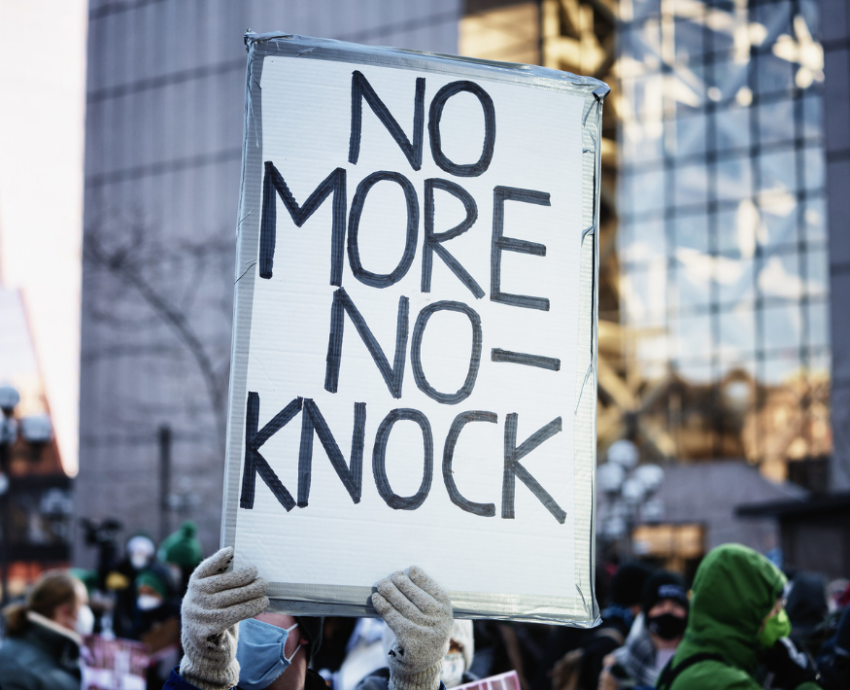
Prosecutors in the United States announced on April 6 that Minneapolis police officer, Mark Hanneman, who fatally shot Amir Locke during a predawn, “no-knock” raid on February 2, will not face charges in the killing.
Locke was sleeping on his cousin’s couch when a SWAT team kicked down the door of the apartment. Within 10 seconds Hanneman had shot and killed Locke.
In the wake of the shooting, police blamed Locke — who was not listed on the police warrant — for his own death.
Hanneman said he saw a gun and opened fire in “fear for his life”. His partners defended his action. Locke did have a gun next to him. It was legal, and he would have been justified in shooting first in self-defence. But he didn’t have time to react.
Mother condemns decision
Locke’s mother, Karen Wells, said she was “disgusted” by the decision not to charge Hanneman and vowed to keep fighting for the accountability of police and city representatives.
“The Minneapolis police executed my baby boy,” Wells told the media in New York, where she stood with lawyer Ben Crump and civil rights leader Reverand Al Sharpton.
“This is not over,” she added. Directly addressing Hanneman, she said: “You may have been found not guilty, but in [my] eyes … you are guilty. And I’m not going to give up … The spirit of my baby is going to haunt you for the rest of your life.”
Indefensible justification by state
Keith Ellison, Minnesota’s first African-American Attorney General and Hennepin County Attorney Mike Freeman jointly reviewed the case and found there was “insufficient admissible evidence to file criminal charges”. They said they could not prove beyond a reasonable doubt that Hanneman had violated the state’s use-of-deadly-force statute.
Ellison also referred to the Constitution’s 4th Amendment, saying what is “reasonable” to a police officer supersedes the rights of anyone confronted by a cop. Therefore, “reasonableness” is determined by police, unless the state in court proves otherwise.
The prosecutors, therefore, could find no criminal wrongdoing in the decision-making that led to Locke’s fatal shooting.
“It would be unethical for us to file charges in a case in which we know we will not prevail because the law does not support the charges,” Ellison said. “And still, a loving, promising young man is dead.”
In a nod to the family and community protesters, Ellison and Freeman strongly criticised the use of a “no-knock warrant”.
“Amir Locke’s life mattered,” Ellison and Freeman said in their public statement. “He should be alive today, and his death is a tragedy.”
Lesson from an unjust system
The police killing of George Floyd’ in Minneapolis in 2020 sparked mass protests nationwide and universal calls for police reform. But Minneapolis — and the country — remain deeply divided on how to get there.
President Joe Biden supports more police finds and opposes the Black Lives Matter movement’s demands for radical change. It’s also why “no-knock” warrants can still be used because of loopholes in city and state ordinances.
The bottom line for African Americans, in particular, is: breathing, walking, driving and even sleeping on a couch can get you shot and killed by a “reasonable” cop.
(I, personally, have a simple policy: never call a police officer for help or to report even a minor accident. It is easier to go to the police station later and file an incident report.)
The Locke killing seemed to the family and the community as a “slam-dunk” case, where the cop who murdered Locke would face a jury trial. Having a Black Attorney General, working within the system, proved worthless.
This exposes, once again, the true nature of the criminal and policing system in the US.
The core problem is not just “no-knock” warrants but the policing system itself. It must be abolished and replaced.